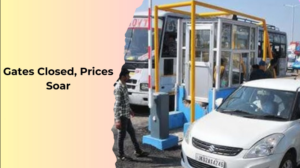Toll-Plaza-Will-Soon-Be-Closed-On-All-Highways-Across-The-Country: Roadway Revolution!

The government has announced plans to eliminate toll plazas on all highways. This new initiative aims to streamline traffic and reduce congestion.
To modernize the nation’s transportation infrastructure, the announcement about closing toll plazas brings a significant change. The move promises to enhance the travel experience by reducing delays at toll booths, often serving as choke points on busy highways.
Integrating advanced toll collection technology will improve road efficiency. Motorists can look forward to smoother journeys without the hassle of stopping to pay toll fees. The transition towards a more streamlined approach reflects the government’s commitment to upgrading road transit and supporting the continual flow of traffic. As these changes unfold, travellers and transportation stakeholders eagerly anticipate the positive impact on highway commutes nationwide.
Contents
- 1 The Imminent Shutdown Of Toll Plazas
- 2 Impacts On Highway Transit
- 3 Alternative Revenue Streams
- 4 Technological Advances In Roadways
- 5 Reactions From The Public & Stakeholders
- 6 Logistical Challenges And Solutions
- 7 Environmental Implications
- 8 Looking Ahead: The Future Of Highways
- 9 Case Studies: Global Perspectives
- 10 Preparing For Change: What Travelers Need To Know
- 11 Conclusion
The Imminent Shutdown Of Toll Plazas

Travellers, brace yourself for a change on the highways. The toll plazas we all know are set to become history. You will soon drive through without stops or fumbling for change. Significant changes are coming, and here’s why.
Reasons Behind The Closure
- Faster commutes: No toll booths mean no queues. This speeds up travel.
- Less pollution: Cars won’t idle at tolls, cutting down emissions.
- Cost-saving: Running toll booths costs money. Shutting them saves it.
- Better technology: Tech advancements make old toll systems outdated.
- Smart transportation: The switch supports the move to intelligent transportation systems.
Projected Frame for Implementation
The shutdown is coming, and it’s only a matter of time. The entire process has a clear timeline. Check it out below.
| Phase | Timeline | Details |
| Planning | Q1 2023 | Strategy and logistics are set in motion. |
| Pilot Testing | Q2 2023 | Trials run on selected highways. |
| Rollout | Q3-Q4 2023 | Phase-out of tolls begins nationwide. |
| Completion | Q1 2024 | All tolls are expected to be gone. |
Impacts On Highway Transit
The recent announcement about toll plazas closing has set the stage for significant shifts in highway travel. This transformative step is not just a mere process change; it’s reshaping the entire highway transit experience. Let’s delve into the specifics of this transit evolution.
Changes In Travel Efficiency
The elimination of toll plazas promises faster travel times for drivers. Delays at toll booths, a common sight during peak hours, will become a thing of the past. Consider the positive ripple effects:
- Smooth traffic flow across highways.
- Reduced congestion and shorter commutes.
- Enhanced fuel efficiency due to continuous vehicle movement.
- Decreased carbon emissions, benefiting the environment.
Impact On Commuting Costs
With toll plaza history, commuting costs are set for a revamp. The direct and indirect savings for the traveller will be substantial:
| Aspect | Cost Impact |
| Fuel Expenses | Reduction due to fewer stops and starts |
| Vehicle Wear | Decrease in maintenance costs over time |
| Time Value | Improved productivity; time savings equate to monetary value |
Furthermore, if implemented, the transition to electronic tolling methods could provide streamlined billing and cost tracking for frequent travellers.
Alternative Revenue Streams
Imagine a future without toll booths on our highways. It’s coming, and it’s going to transform the way we manage road revenue. No more waiting in line, no more fumbling for loose change. But with toll plazas closing, the big question arises: How will road maintenance get its funding? Let’s explore pioneering revenue alternatives that can keep our highways smooth and efficient.
Proposed Financing Models
Roads still need money for upkeep. Experts have proposed several financing models to replace traditional toll plazas. Each model aims to maintain a steady flow of funds without breaking a driver’s bank. Here are the most talked-about alternatives:
- Vehicle Miles Traveled Tax: Pay based on distance covered.
- Public-Private Partnerships: Let private companies invest in infrastructure.
- Transportation Utility Fees: Add fees to utility bills for road funding.
- General Sales Tax: A slight increase in sales tax can be earmarked for roads.
Role Of Electronic Toll Collection
Goodbye to toll booths; hello, high-tech. Electronic Toll Collection (ETC) systems are at the forefront, redefining how we pay for roads. ETC is beyond just convenience; it’s a critical cog in the future of highway financing. Here’s how ETC benefits all:
- Time Saver: No stopping means no traffic jams.
- Cost-Efficient: Less money spent on toll booth operations.
- Environmentally Friendly: Fewer idling cars means cleaner air.
- Smart Finances: Accurate, fast, and fraud-resistant transactions.
ETC adapts to various payment models, making it a versatile tool for the road funding toolbox. It can handle per-mile charges, congestion pricing, or monthly pass systems. By leveraging technology, the ETC system promises to keep our roads funded well into the future.
Technological Advances In Roadways
Significant changes are rolling out on highways across the country. The old toll plaza system is bidding goodbye. This shift signals a new era in roadways powered by high-tech solutions. Advances in technology promise smoother rides and less congestion. Imagine gliding down highways with no toll booths in sight. This vision is fast becoming a reality with the introduction of cutting-edge traffic management systems and intelligent road technologies that are changing the face of our travel experience.
Innovations In Traffic Management
Efficiency is the new game-changer in traffic flow. With innovations in traffic management, the days of long queues at toll plazas are over. Highways will now use automated systems to streamline traffic and minimize delays. These systems read license plates or scan digital passes, allowing for a nonstop travel experience.
- Sensors and AI: Predict and manage traffic patterns
- Dynamic Signage: Provides real-time information
- E-toll Systems: Enable automatic toll payments
Introduction Of Smart Roads
Intelligent roads are no longer a concept of the future. With digital technology embedded right into the road infrastructure, smart roads adapt to changing conditions and improve safety and efficiency on our highways.
- Embedded Sensors: Monitor road conditions and send alerts
- Energy Harvesting: Convert traffic into renewable energy
- Connected Systems: Communicate with innovative vehicles
Reactions From The Public & Stakeholders
The announcement that toll plazas will soon cease highway operations has sparked diverse reactions. The move, aimed at easing travel and reducing traffic congestion, resonates differently across various sectors. We’ve captured the nation’s pulse to bring you an in-depth look at what people think about this dramatic change.
Consumer Responses
Travellers and daily commuters express a mix of joy and scepticism.
- Reduced travel costs and shorter trip times elicit positive feedback.
- Some worry about potential increases in fuel taxes as an alternative revenue source.
Online platforms showcase a flurry of comments ranging from enthusiasm for smoother drives to concerns over government funding for road maintenance without tolls.
Transportation Industry Perspective
The transportation sector provides a nuanced take on the upcoming changes.
| Stakeholder | Viewpoint |
| Logistics Companies | Anticipate lower operational costs and faster delivery times. |
| Toll Operators | I am concerned about the shift, forecasting job losses and a search for new business models. |
| Road Maintenance Agencies | Urgent discussions on alternative funding for infrastructure upkeep are underway. |
Logistical Challenges And Solutions
The announcement that toll plazas will soon be closed on highways is momentous. Yet, it brings a few logistical hurdles. This segment explores the challenges and lays out potential solutions. Effective strategies promise smoother transitions away from traditional toll collection. Let’s delve into the logistics of handling traffic congestion and upgrades to infrastructure.
Handling Traffic Congestion
With the removal of toll booths, traffic flow may initially face hurdles. Congestion points might shift, causing unexpected delays. Solving this requires a multipronged approach:
- Implement advanced traffic monitoring systems to track and report congestion.
- Promote alternative routes to diffuse traffic build-up.
- Ensure motorists are well-informed of changes through digital signs and alerts.
Digital tools and AI can manage traffic flows, reducing congestion.
Upgrades To Infrastructure
New technologies will replace physical toll plazas. This demands significant infrastructure upgrades. The strategy includes:
| Upgrade | Function |
| Electronic Toll Collection (ETC) | Seamless payments while driving through |
| Smart Signage | Real-time information for drivers |
| Automated Traffic Management | Better control of flow and vehicle tracking |
Environmental Implications
The announcement that toll plazas will soon disappear on all highways across the country also breathes fresh air into the environment. Let’s examine how this change may contribute to a greener and more sustainable future.
Reduction In Emissions
Idle engines at toll plazas are a significant source of emissions. Without the need to stop and pay, vehicles will maintain a constant flow, leading to a sharp decrease in exhaust pollution. This move promises a notable reduction in greenhouse gases, mainly CO2, which is a win for the planet.
- Decreased fuel consumption leads to fewer emissions
- Fewer traffic jams around toll booths means less idling
- Improved air quality benefits all living organisms
Sustainability Benefits
Eliminating toll plazas translates into long-term environmental sustainability benefits. Roads will see a reduction in maintenance due to less frequent start-stop traffic patterns. Furthermore, the move encourages eco-friendly transportation alternatives like carpooling since commuting becomes more time-efficient on toll-free roads.
| Sustainability Factor | Impact |
| Resource Conservation | Less wear and tear on highways |
| Energy Savings | Reduced demand for toll-related infrastructure |
| Wildlife Protection | Minimized habitat disruption |
| Economic Efficiency | Cost savings redirected to sustainable projects |
Looking Ahead: The Future Of Highways
The Future of Highways stands on the brink of transformative change. Imagine a world where long waits at toll plazas are a thing of the past. This vision will become a reality as toll plazas close on all highways nationwide. It’s a significant leap towards efficient, streamlined, and cost-effective road travel.
Long-term Vision For Transportation
The transition away from traditional toll plazas hints at a broader shift in transport policy. Infrastructure evolves to accommodate new technology. The focus shifts to sustainability and intelligent traffic management. Highways will soon embody:
- Automated toll collection systems
- Smart roads with sensors
- Electric vehicle (EV) friendly networks
- Reduced congestion and pollution
Potential For Nationwide Economic Impact
Eliminating toll plazas can fuel economic growth. Streamlined highways ease transport for businesses, lowering costs and expediting deliveries.
| Economic Benefits of Toll-Free Highways | |
| Impact Area | Benefit |
| Transportation Costs | Decrease |
| Delivery Speed | Increase |
| Environmental Health | Improve |
| Vehicle Wear and Tear | Reduce |
Retailers, manufacturers, and logistics companies will benefit. This boosts local and national economies, creates jobs, and opens markets. As intuitive technology takes over, toll-free highways could become the main arteries of trade.
Case Studies: Global Perspectives
The move towards a toll-plaza-free highway system marks a transformative step in modern transportation. Various countries have pioneered the shift around the world. They offer valuable insights, and their experiences serve as case studies for policymakers. Drawing from global perspectives, specific patterns emerge. Success stories inspire. Pain points teach critical lessons. Well-rounded best practices emerge from these narratives. Let’s explore the global landscape through case studies.
Successes From Other Countries
Several nations have successfully implemented free-flow highway systems. These are models of efficiency and user satisfaction. We see outstanding outcomes in technological integration and revenue management. Let’s dig into a few examples:
- Norway: Adopted electronic toll collection to reduce congestion. They saw improved traffic flow.
- Sweden: Implemented congestion taxes in urban areas. This led to smoother commutes and lower emissions.
- India: Introduced FASTag, an electronic toll system. This system curtailed waiting times at toll booths significantly.
Lessons Learned And Best Practices
Effective change boils down to learning from past endeavours. The transition to toll-free highways is the same. Here are essential takeaways:
- Comprehensive planning is crucial for seamless transitions.
- Public awareness campaigns are essential.
- Adapting to the local context ensures success.
Leveraging these lessons, certain best practices have materialized: robust technology infrastructure and flexible payment options stand out as essentials. They ensure continuity of revenue while enhancing motorist experience.
| Country | Technology Used | User Benefit |
| Italy | Telepass RFID System | Reduced Transit Times |
| France | Télépéage Automated Tolls | Decreased Congestion |
| Singapore | Electronic Road Pricing | Lane Discipline |
Preparing For Change: What Travelers Need To Know
Travellers, big news! Toll plazas will no longer greet you on highways. Prepare for a seamless journey! Let’s delve into what this change entails.
Adapting To New Systems
Digital toll payments are replacing old booths. Ready your devices and apps to make your drive smoother.
- Familiarizing with RFID – Radio Frequency Identification tags will become your new best friend.
- Download necessary apps—Certain apps allow you to pay tolls digitally. Install them ahead of your trip!
- Keep your devices charged – Ensure your smartphones or tablets are fully charged to avoid any payment hiccups.
Educational Initiatives For Road Users
The government is launching campaigns to educate drivers. There is much to learn, they have.
| Resource | Type | Availability |
| Online tutorials | Video | 24/7 online access |
| Workshops | Interactive | Scheduled across cities |
| Help Desks | Assistance | At major highway entries |
Stay tuned for dates and details on these educational programs. Also, check officials’ websites and local news.
Conclusion
As we prepare to say farewell to toll plazas on highways nationwide, travellers can anticipate smoother journeys and less congestion. The decision marks a significant shift towards efficiency and modern infrastructure, promising a future of hassle-free road trips. Embrace this change, as it paves the way for expedited travel and a streamlined transportation experience.




